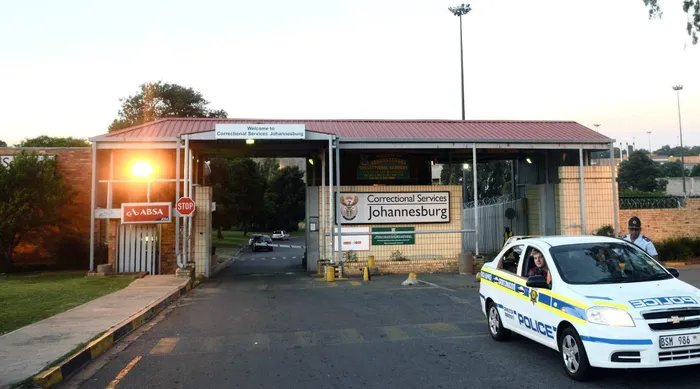Transgender inmate battles for gender identity recognition in Equality Court

Transgender prisoner Nthabiseng Mokoena wants bosses at the Johannesburg Correctional Centre to respect her rights, gender identity, and assist her with changing her gender marker.
Image: Antoine de Ras / Independent Newspapers
A transgender Johannesburg Correctional Centre inmate has turned to the Equality Court to enforce her rights to express her gender identity and to be addressed as a woman using the "she/her" pronoun.
Nthabiseng Mokoena, who is represented by Lawyers for Human Rights (LHR), has hauled Sun City prison bosses, Correctional Services National Commissioner Makgothi Thobakgale, Correctional Services Minister Dr Pieter Groenewald, and his health counterpart Dr Aaron Motsoaledi, Gauteng Health MEC Nomantu Nkomo-Ralehoko, as well as the judicial inspectorate for Correctional Services to the Equality Court, sitting at the Gauteng High Court, Johannesburg.
She said she is fighting to end the discriminatory and degrading treatment she is subjected to.
Mokoena wants the court to declare that the failure or refusal of Lucky Mabhena, the head of the Johannesburg Correctional Centre, also known as Sun City, to allow her to express her gender through clothing, cosmetics, and toiletries that reflect her gender identity at all times in the prison, and to address her as a woman or use the "she/her" pronouns, as well as bullying her, constitutes unfair discrimination under the Promotion of Equality and Prevention of Unfair Discrimination Act (Pepuda).
She believes the conduct is unlawful and unconstitutional. Additionally, Mokoena has requested the Equality Court to instruct prison officials to allow her to express her gender identity at all times throughout the Johannesburg Correctional Centre by addressing her as a woman or using the "she/her" pronoun, and to cease bullying her.
She also requests that all Correctional Services officials at the facility do the same, provided that if she is transferred to another correctional centre, the order will still apply.
She wants the prison bosses’ conduct towards her declared harassment under Pepuda and directing them to assist her with changing her gender marker in terms of the Alteration of Sex Description Act.
Mokoena wants prison bosses, Thobakgale, Groenewald, Motsoaledi, and Nkomo-Ralehoko to be directed to "provide the applicant (Mokoena) with gender-affirming healthcare as provided for in the definition of primary healthcare in the Correctional Services Act, which will enable me to change my gender marker".
Alternatively, she has asked the court to direct that gender-affirming healthcare be read into the definition of primary healthcare in the Correctional Services Act, and that the respondents accordingly provide her with gender-affirming health care, which will enable her to change her gender marker.
Mokoena wants Mabhena, the area commissioner for the Johannesburg management area, and Thobakgale to be directed to assist her with changing her names in terms of the Birth and Death Registration Act.
Additionally, Mabhena and the area commissioner must accommodate her in a single cell or in the same cell with inmates of the same gender identity as contemplated by the standard operating procedures for the management of lesbian, gay, bisexual, transgender, and intersex inmates.
Thobakgale, on behalf of Groenewald, Mabhena and the area commissioner, opposed Mokoena’s application and stated that she was due for parole in July.
He denied that the department’s conduct constituted harassment or was intended to demean, humiliate, or create a hostile or intimidating environment for Mokoena.
Thobakgale said the change of gender marker fell under the Department of Home Affairs and undertook to facilitate the application.
He further stated that Correctional Services never prevented Mokoena from accessing gender-affirming healthcare, and that she did not follow internal procedures for referral but instead self-referred to specialists.
"The applicant (Mokoena) then proceeded to self-medicate, which, given the potential complications is, in and of itself, dangerous," Thobakgale explained.
On Mokoena’s seeking a single cell or the same cell of gender identity, he stated that this was not possible due to overcrowding and the fact that Sun City does not have another prisoner who is transgender.
National Department of Health Deputy Director-General Dr Nicholas Crisp indicated that Motsoaledi does not oppose Mokoena’s application and will abide by the court’s decision.
According to Crisp, the challenges faced by transgender persons who are incarcerated were well documented as they are susceptible to a myriad of problems, especially concerning living their chosen gender identity, including wrong classification, victimisation, and ill-treatment.
"Due to the high demand and limited services, there are long waiting lists for gender–affirming treatments and surgeries. This is a significant barrier, which will be addressed in the short-term, resources permitting," he told the court.
Crisp added that the high costs of gender–affirming treatments and surgeries can be a significant barrier even for those with private healthcare.
He said there were efforts to expand access to gender–affirming care, but challenges remain, including long waiting lists, limited resources, and a lack of formal policies and guidelines.
The matter was finalised on Friday, and judgment has been reserved.
The LHR said it was not sure when the judgment would be handed down, but it will be delivered electronically.
loyiso.sidimba@inl.co.za